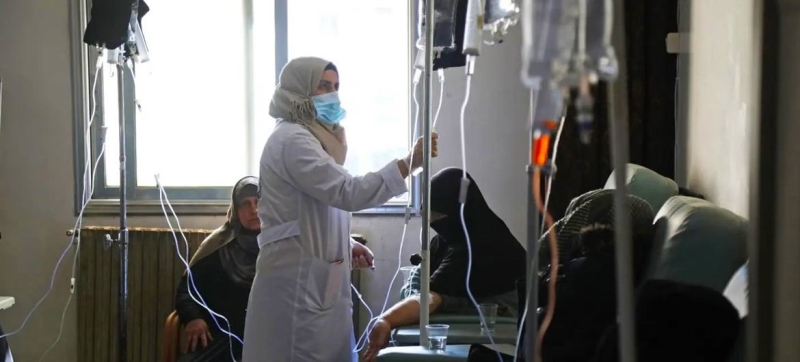- Dhaka’s air ‘unhealthy for sensitive groups’ Wednesday morning |
- US proposes that the UN authorize a Gaza stabilization force for 2 years |
- Democrat Zohran Mamdani is elected New York City mayor |
- Martyr Mugdha's brother Snigdha steps into politics with BNP |
- FAO Warns of ‘Silent Crisis’ as Land Loss Threatens Billions |
Syria Faces Health Crisis Amid Severe Funding Shortages

A doctor treats a cancer patient in a hospital in Idleb, north-west Syria. (file)
Hopes for a peaceful future in post-war Syria are at risk as funding for basic services dries up, the World Health Organization (WHO) said on Tuesday.
This comes 11 months after the country’s civil war ended with the overthrow of the Assad regime by opposition forces loyal to new President Ahmad Al-Sharaa.
As Syrians return home in increasing numbers, the shattered country faces chronic shortages of medicines, power, equipment, and inward investment.
According to WHO, only 58 per cent of hospitals and 23 per cent of primary healthcare centres are fully functional.
“Services on the ground remain very fragile… health needs are still rising,” warned the UN agency’s representative in Syria, Dr Christina Bethke.
She said that since mid-year, more than 400 health facilities have been affected by funding cuts, and 366 have suspended or reduced services.
A total of 7.4 million people have seen their access to medicines and treatment shrink, WHO reports.
In just two months, this has prevented 122,000 trauma consultations and meant that 13,700 births have taken place without a skilled attendant.
“We continue to see shortages of healthcare workers, and the conditions to enable the return of skilled professionals are still not in place,” Dr Bethke told journalists in Geneva via video from Damascus.
More Than a Million Return Home
Latest UN data indicates that more than 1.16 million Syrians have returned home since the fall of the Assad regime.
The lack of healthcare is a major factor discouraging more returns, in addition to widespread destruction of homes and infrastructure, insufficient jobs, and ongoing security risks.
According to UNHCR, over seven million Syrians remain displaced inside the country, and more than 4.5 million live abroad.
“Most people would prefer to return with their families. If you are contemplating a return, you need to know there’s a school, shelter, electricity, water, and connectivity,” Dr Bethke explained.
Imminent Flashpoints
In Syria’s northeast, Hassakeh National Hospital could lose donor support next month. It is the only comprehensive public hospital for over 300,000 people. Without funding, key services like ambulances, referrals, and round-the-clock primary care in camps could collapse.
Support to al-Kasrah General Hospital in Deir-ez-Zor has also been suspended, forcing most departments to halt operations, leaving only dialysis and physiotherapy functioning – affecting over 700,000 people.
To maintain healthcare in Syria, the UN and partners require $565.5 million, of which only around 20 per cent has been received. WHO alone needs $141.5 million this year, with $77 million still unfunded.
"Without predictable, multi-year support, the health system could unravel just as recovery is within reach,” Dr Bethke warned.

